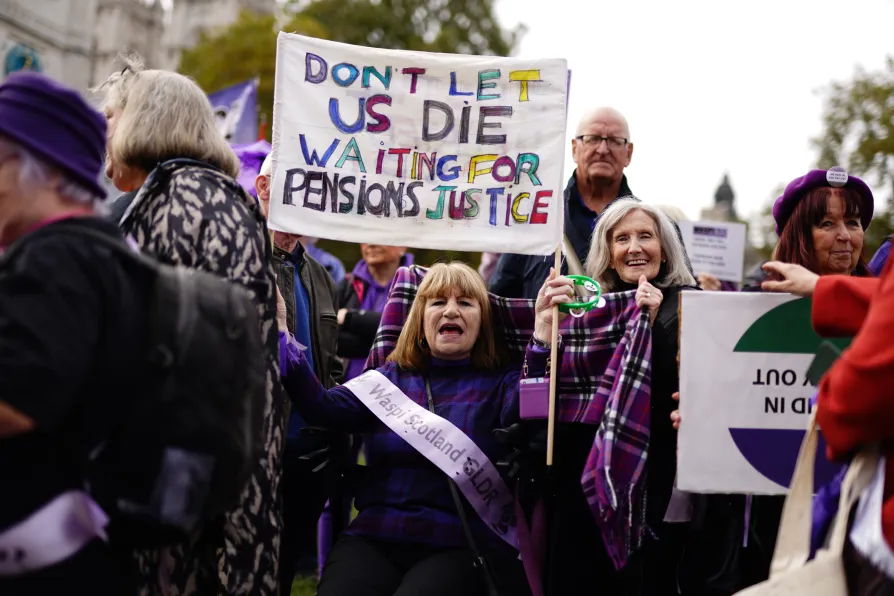
 Waspi (Women Against State Pension Inequality) campaigners stage a protest on College Green in Westminster, London, as Chancellor of the Exchequer Rachel Reeves delivers her Budget in the Houses of Parliament, October 30, 2024
Waspi (Women Against State Pension Inequality) campaigners stage a protest on College Green in Westminster, London, as Chancellor of the Exchequer Rachel Reeves delivers her Budget in the Houses of Parliament, October 30, 2024
HMRC’S ignorance about how much tax British billionaires pay exposes the missing factor in government announcements on public spending.
Tight finances are used as excuses to attack pensioners and deny justice to the wronged, like the Waspi women.
Even when — thanks to a welcome revolt against Rachel Reeves’s renewed austerity by Labour MPs — cuts to disability payments are reduced in scope, ministers suggest the pain will be shunted sideways: it will make it harder to lift the two-child benefit cap, or force a regressive freeze on income tax thresholds (so they don’t rise with inflation, distributing the tax burden downwards).
The public accounts committee’s Lloyd Hatton says its report is “not concerned with political debate around the redistribution of wealth,” and is intended solely to address shortcomings in HMRC’s ability to collect the tax owed.
But the doubt it casts on HMRC’s own estimates of the “tax gap” (the difference between tax owed in theory and tax collected) has significant implications for public spending choices.
Besides, the failure to introduce land and wealth taxes is one reason the very wealthy are able to hide their assets, and indeed real incomes, so effectively.
The concentration of extreme wealth among an ever smaller number of people is accelerating. It is pronounced enough — with just 50 families owning as much as the poorer 50 per cent of the British population — to distort the entire economy.
It does so for tax purposes: since the rich can offshore assets and deploy financial jiggery-pokery (such as borrowing against their assets to appear to be in debt) in ways ordinary people can’t, and assets are in the first place taxed less heavily than the earned income on which the vast majority rely, a more even distribution of wealth would increase the share of it accessible for public investment.
It does so for political purposes too, since wealth confers power.
In Britain we’ve seen that power used to affect decisions with far-reaching economic consequences.
Ending oil refining at Grangemouth and collapsing the plant into a mere import terminal rather than transforming it into a hub for production of green fuels was down to Labour dancing to the tune of co-owner Ineos tycoon Jim Ratcliffe.
The profit-and-loss calculations of billionaires in other parts of the world closed the blast steel furnaces at Port Talbot.
And the concentration of wealth is a global problem: the world’s billionaires (there were 2,679 of them last year according to Oxfam, or 0.00003 per cent of the Earth’s population) own over 60 per cent of everything.
The political power wielded by plutocrats is more truly global than ever before, whether we consider the control of information by social media tycoons like Mark Zuckerberg and Elon Musk, the internationalised union-busting of Amazon founder Jeff Bezos, or the sinister amassing of human data to inform state surveillance, artificial intelligence and war by companies associated with PayPal and Palantir founder Peter Thiel.
The public accounts committee may not wish to engage in “political debate around the redistribution of wealth” but it is urgent that the rest of us force this question onto the agenda.
Wealth taxes as proposed by major unions — Unite points out that a 1 per cent tax on people with over £4 million would raise £25 billion a year — are increasingly popular. Introducing a wealth tax is TUC policy, and even Keir Starmer declined to rule it out after one was plugged by the unlikely figure of Neil Kinnock.
These taxes would release funds to invest in battered services, cash-strapped councils and workers’ pay.
But they would also restore the principle that redistributing wealth is part of the government’s job.
That we are not “intensely relaxed about people getting filthy rich,” to use Lord Mandelson’s infamous phrase, because the existence of the filthy rich in itself poisons politics and undermines democracy.














